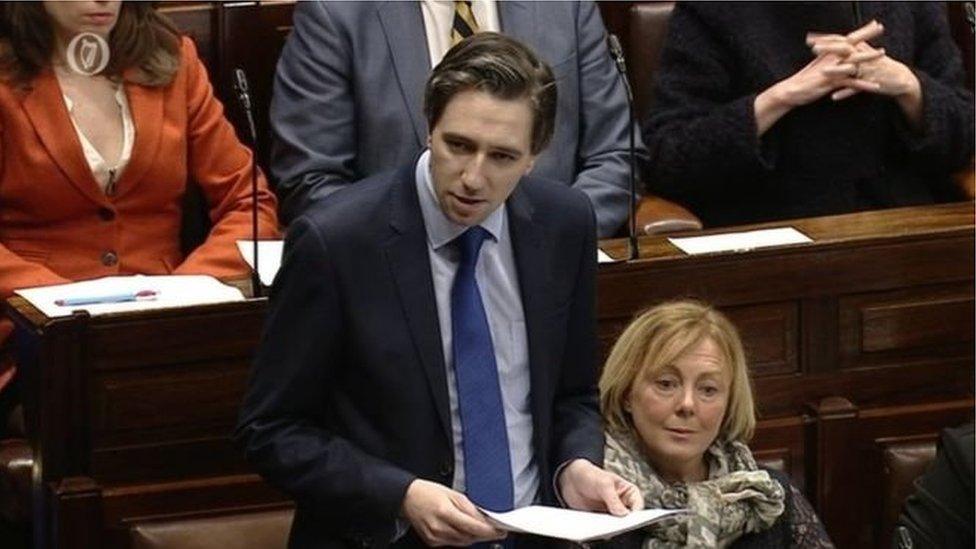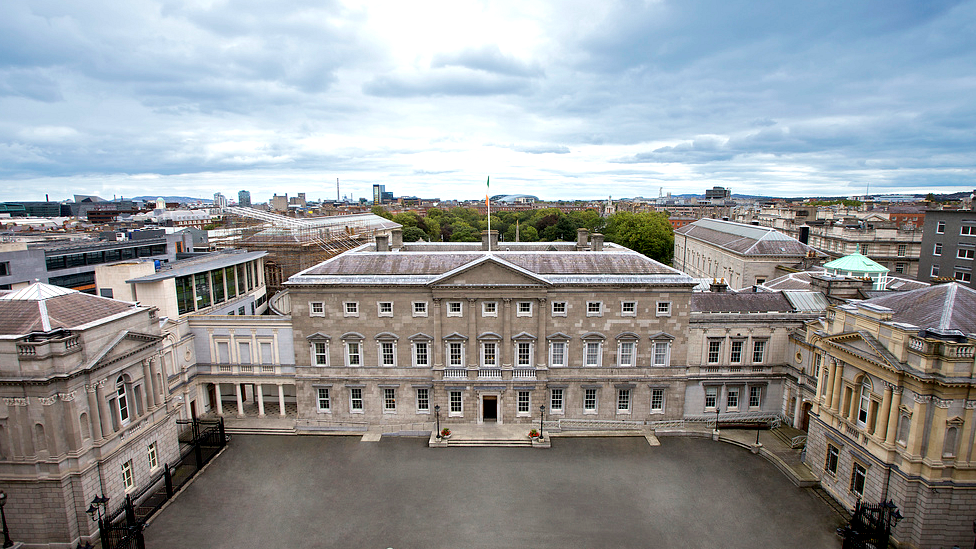Irish government to examine NI women's abortion access
- Published
Irish government will examine NI access to abortion
The Irish government will examine whether women in Northern Ireland will be able to access abortion services in the Republic of Ireland.
Taoiseach (Irish prime minister) Leo Varadkar said he "imagined" current rules would apply where all Irish citizens across the border could avail of health facilities in the south.
Meanwhile the Royal College of Obstetricians and Gynaecologists (RCOG) has called for women in Northern Ireland to be given the same access to abortion as in the rest of the UK.
The Republic of Ireland voted to overturn its abortion ban on Friday.
The final result, which was announced on Saturday, saw the Eight Amendment repealed by 66.4% to 33.6%.
Under the Eighth Amendment, which grants an equal right to life to the mother and unborn, abortion is only allowed when a woman's life is at risk - not in cases of rape, incest or fatal foetal abnormality.
'As soon as possible'
Mr Varadkar was responding to a question from Micheál Martin, the leader of Fianna Fáil, the main opposition party in the Dáil (Irish Parliament).
He asked the government to "consider" allowing women from Northern Ireland to avail of abortion services south of the border.
Mr Varadkar told the Dáil that he hoped the proposed legislation, that would allow for abortion on request during the first 12 weeks of a pregnancy, could pass its second stage before the summer recess to allow the measure become law by the end of the year.
He said he was "agreeable if necessary" to extend Dáil sittings to get the proposed bill become law as soon as possible.
Unlike the rest of the UK, abortion in Northern Ireland is only permitted if a woman's life is at risk or there is a permanent or serious risk to her mental or physical health.
The RCOG released a statement later on Tuesday calling for a significant change to the law in Northern Ireland.
RCOG President Professor Lesley Regan said: "The RCOG believes that women in Northern Ireland should have the same access to abortion care as women in the rest of the UK.
"The current legal situation means healthcare professionals in Northern Ireland struggle to provide support for women requesting an abortion or safely manage any post-abortion complications.
"We recognise that this is a highly politicised issue but the current situation is unacceptable and leaves doctors, nurses and midwives working in a precarious legal vacuum in this core part of women's sexual and reproductive healthcare."

Simon Harris made the comments before a cabinet meeting on Tuesday
Earlier on Tuesday the Irish health minister said it is important to be realistic about the time it will take to enact abortion legislation.
Simon Harris made the comments ahead of a cabinet meeting at parliament buildings.
Mr Harris said he wants it to be implemented as quickly as possible, but added he is determined to get it right for doctors and patients.
Legislation to be brought to Dáil
On Tuesday, Simon Harris confirmed that legislation to bring the result into effect will be introduced in the Dáil before summer recess.
He said he hopes to publish a bill in the coming weeks and to begin a debate.
However he said there is also a need for clinical guidelines to be drawn up by practitioners and regulations of medication to be in place.

Irish national broadcaster, RTE, reports that the Chair of the Oireachtas (Irish Parliament) Health committee has said it is likely to sit during the summer month to progress the legislation.
Leo Varadkar, the Irish prime minister, has already said he wants to have guidelines, legislation and new regulations for abortion pills to be completed by the end of this year.
In turn, abortion services would be introduced by January 2019.
The Dáil and cabinet are expected to discuss the referendum result on Tuesday afternoon.
- Published27 May 2018

- Published26 May 2018
